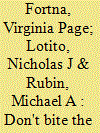| Srl | Item |
| 1 |
ID:
163274


|
|
|
|
|
| Summary/Abstract |
Why do some rebel groups resort to terrorism tactics while others refrain from doing so? How rebel organizations finance their rebellion creates variation in the extent to which terrorism undermines their legitimacy. Rebel organizations pay attention to the legitimacy costs associated with terrorism. Organizations that rely primarily on civilian support, and to a lesser extent on foreign support, exercise more restraint in their use of terrorism. Rebels who finance their fight with lootable resources such as gems or drugs are least vulnerable to the costs of alienating domestic supporters. Thus, they are more likely to resort to terrorism and to employ more of it. The article elaborates this legitimacy-cost theory and tests it using new data on Terrorism in Armed Conflict from 1970 to 2007. We find robust support for the hypothesis that groups who finance their fight with natural resources are significantly more likely to employ terrorism (though not necessarily to conduct more deadly attacks) relative to those who rely on local civilian support. Groups with external sources of financing, such as foreign state support, may be more likely to engage in terrorism than those who rely on local civilians, but not significantly so.
|
|
|
|
|
|
|
|
|
|
|
|
|
|
|
|
| 2 |
ID:
173778


|
|
|
|
|
| Summary/Abstract |
Under what conditions do rebel organizations control territory during civil war? How do civilians influence the distribution of territorial control? This article introduces a civilian agency theory, emphasizing community collective action capacity (CAC) defined by underlying social network structure, to complement existing explanations of territorial control. I argue communities with greater CAC mobilize information and resources more efficiently, increasing belligerents’ incentives to control territory. However, CAC also increases community bargaining power to demand costly investments in governance, partially offsetting these gains. CAC increases rebel control in areas of state neglect. But, as state service provision increases, communities leverage CAC to demand prohibitively costly rebel governance, deterring rebel control. This article tests the theory in the context of the communist insurgency in the Philippines, using military intelligence reports from 2011 to 2014 to measure village-level communist insurgent territorial control and a household-level census (2008–2010) to measure village CAC. Interviews with village elders in Eastern Mindanao illustrate causal mechanisms and explore alternative explanations.
|
|
|
|
|
|
|
|
|
|
|
|
|
|
|
|